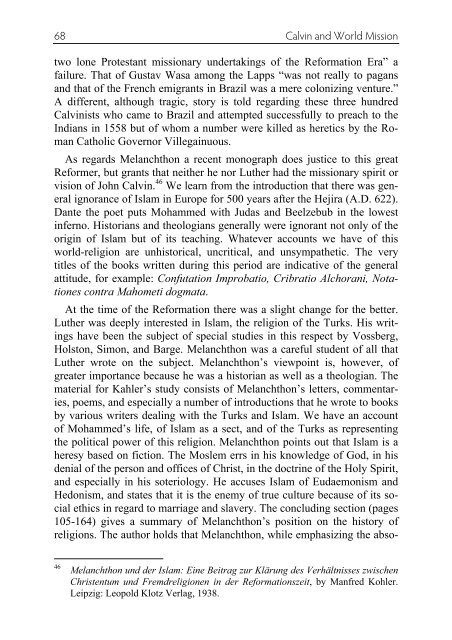Calvin and Missions - World Evangelical Alliance
Calvin and Missions - World Evangelical Alliance
Calvin and Missions - World Evangelical Alliance
Create successful ePaper yourself
Turn your PDF publications into a flip-book with our unique Google optimized e-Paper software.
68 <strong>Calvin</strong> <strong>and</strong> <strong>World</strong> Mission<br />
two lone Protestant missionary undertakings of the Reformation Era” a<br />
failure. That of Gustav Wasa among the Lapps “was not really to pagans<br />
<strong>and</strong> that of the French emigrants in Brazil was a mere colonizing venture.”<br />
A different, although tragic, story is told regarding these three hundred<br />
<strong>Calvin</strong>ists who came to Brazil <strong>and</strong> attempted successfully to preach to the<br />
Indians in 1558 but of whom a number were killed as heretics by the Roman<br />
Catholic Governor Villegainuous.<br />
As regards Melanchthon a recent monograph does justice to this great<br />
Reformer, but grants that neither he nor Luther had the missionary spirit or<br />
vision of John <strong>Calvin</strong>. 46 We learn from the introduction that there was general<br />
ignorance of Islam in Europe for 500 years after the Hejira (A.D. 622).<br />
Dante the poet puts Mohammed with Judas <strong>and</strong> Beelzebub in the lowest<br />
inferno. Historians <strong>and</strong> theologians generally were ignorant not only of the<br />
origin of Islam but of its teaching. Whatever accounts we have of this<br />
world-religion are unhistorical, uncritical, <strong>and</strong> unsympathetic. The very<br />
titles of the books written during this period are indicative of the general<br />
attitude, for example: Confutation Improbatio, Cribratio Alchorani, Notationes<br />
contra Mahometi dogmata.<br />
At the time of the Reformation there was a slight change for the better.<br />
Luther was deeply interested in Islam, the religion of the Turks. His writings<br />
have been the subject of special studies in this respect by Vossberg,<br />
Holston, Simon, <strong>and</strong> Barge. Melanchthon was a careful student of all that<br />
Luther wrote on the subject. Melanchthon’s viewpoint is, however, of<br />
greater importance because he was a historian as well as a theologian. The<br />
material for Kahler’s study consists of Melanchthon’s letters, commentaries,<br />
poems, <strong>and</strong> especially a number of introductions that he wrote to books<br />
by various writers dealing with the Turks <strong>and</strong> Islam. We have an account<br />
of Mohammed’s life, of Islam as a sect, <strong>and</strong> of the Turks as representing<br />
the political power of this religion. Melanchthon points out that Islam is a<br />
heresy based on fiction. The Moslem errs in his knowledge of God, in his<br />
denial of the person <strong>and</strong> offices of Christ, in the doctrine of the Holy Spirit,<br />
<strong>and</strong> especially in his soteriology. He accuses Islam of Eudaemonism <strong>and</strong><br />
Hedonism, <strong>and</strong> states that it is the enemy of true culture because of its social<br />
ethics in regard to marriage <strong>and</strong> slavery. The concluding section (pages<br />
105-164) gives a summary of Melanchthon’s position on the history of<br />
religions. The author holds that Melanchthon, while emphasizing the abso-<br />
46 Melanchthon und der Islam: Eine Beitrag zur Klärung des Verhältnisses zwischen<br />
Christentum und Fremdreligionen in der Reformationszeit, by Manfred Kohler.<br />
Leipzig: Leopold Klotz Verlag, 1938.

















